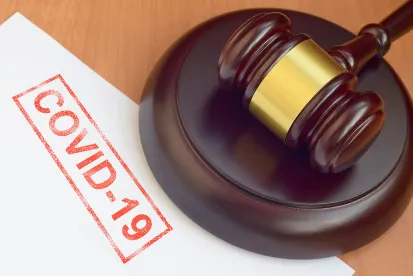On November 30, Pennsylvania Governor Tom Wolf vetoed controversial House Bill 1737. The Republican-backed Bill was passed by Pennsylvania legislators in November 2020, and extended the reach of Governor Wolf’s May 6 executive order, which had granted civil liability protection to licensed or certified healthcare practitioners providing patient care during COVID-19. The executive order does not shield practitioners from claims of gross negligence, fraud, malice, or other willful misconduct; and does not protect nursing homes or other healthcare facilities from liability. House Bill 1737 would have temporarily extended civil liability protection to hospitals, nursing homes, schools, businesses, manufacturers, and other entities but like the executive order would have offered no protection against claims for gross negligence or willful misconduct. In his November 30 veto statement, Governor Wolf explained that despite the Bill’s benefits, he withheld his signature because he believed the liability protection was too broad and would invite carelessness and a disregard for public safety.
According to the Wall Street Journal, nearly 80 associations representing schools, child-care providers, and small businesses backed the Bill. The veto came as a disappointment to those supporters, who viewed the legislation as a narrowly tailored and necessary response to the threat of frivolous lawsuits during a vulnerable time. In a November 20 press release statement, Curt Schroder, Executive Director of the Pennsylvania Coalition for Civil Justice noted, “the Bill was drafted, debated, and passed to protect the heroes of this pandemic, while still holding accountable bad actors engaged in intentional conduct or gross negligence who were not following health orders and guidelines. This reasonable approach is the right approach for Pennsylvania.” Bill supporters are concerned that lawsuits will be filed against businesses challenging their efforts to comply, or failures to comply, with safety and health guidelines, but the question is whether they need a broad liability shield to protect them from such litigation.
Governor Wolf expressed sympathy for business owners in his veto statement but raised significant concerns about what he viewed as the Bill’s overly broad coverage. First, the Bill primarily served a non-COVID-19 agenda and advanced business interests that long pre-dated the COVID-19 pandemic. The Bill is divided into three subchapters. The first addresses liability protections for economic development agencies, fiduciaries, and lenders to shield them from liability for the environmental impacts of their activities and the second addresses liability protections for agri-tourism activities, i.e., activities related to farm tours or farm entertainment. Together they make up roughly 80% of the Bill, and COVID-19 liability protections are discussed only in the third subchapter. In his veto statement, Governor Wolf voiced concern that even the COVID-19 liability protections were too broad. He wrote that the “bill significantly expands these protections by limiting liability to various entities, including manufacturers, distributors, labelers and users of personal protective equipment, business services and covered providers. Shielding entities from liability in such a broad fashion as provided under this bill invites the potential for carelessness and a disregard for public safety.” Governor Wolf noted, “Providing immunity for a business that does not rigorously comply with public health orders does not ensure the safety of the public, [or] its employees and is not in the public interest.” Governor Wolf’s stance has been described as anti-business, although he has continued to ensure that there are other laws and initiatives to provide business owners with liability protection.
Provisions Protecting Pennsylvania Businesses from Frivolous COVID-19 Lawsuits
Even without Bill 1737, there are other provisions that assist businesses in Pennsylvania and shield them from COVID-19 related lawsuits. First, the federal Public Readiness and Emergency Preparedness Act (“PREP Act”), protects individuals involved in the distribution and/or dispensing of medical countermeasures, such as antibiotics, from tort liability in state or federal court. The only individuals not protected are those engaged in willful misconduct in violating COVID-19 safety protocols. Next, in addition to Governor Wolf's May 6th executive order granting liability immunity to licensed health care practitioners in Pennsylvania, this past November, due to rising COVID-19 cases in Pennsylvania, Governor Wolf announced new measures, including civil liability immunity for businesses enforcing then Secretary of Health Rachel Levine’s mask order. The protection would only extend to businesses engaged in essential emergency services, “that maintain in-person operations and are open to the public.” Finally, business owners also have the normal protections of tort law, as potential plaintiffs may struggle to prove the essential elements of duty, breach, and damages in a personal injury or wrongful death claim arising from their contracting the COVID-19 virus as a result of their interactions with a business that was following CDC health and safety guidelines.
Federal Business Liability Protections During the Pandemic
In December, lawmakers in Washington worked on a federal relief bill, and there was extensive debate over liability protections for businesses. Senate Republicans were insistent on sweeping protections that Democrats would not agree to. In the end, the Bill became law on December 22, 2020, without the inclusion of business liability protections. Former Senate Majority Leader Mitch McConnell said during an interview with Fox News that if there is another coronavirus relief bill after the first of the new year, he will push for business protections. Despite his commitment to business liability protection, the next relief bill will likely be approved without Republican participation. President, Joe Biden is focused on getting the $1.9 trillion stimulus plan passed but has given up on bipartisan support and is pursuing reconciliation—a method of expediting the approval of some tax and spending bills by a majority vote in the House and Senate. On February 3, the House passed a budget resolution, and on February 5 the Senate approved a resolution. This approval will allow Congress to move forward with reconciliation, through which Democrats can pass a COVID-19 relief bill without Republican support.
As federal lawmakers continue working on the parameters of a COVID-19 relief Bill, the inclusion of business liability protections seems unlikely. Pennsylvania will likely join other states in creating laws that address COVID-19 liability protections for business owners. Although Governor Wolf vetoed House Bill 1737, similar legislation will likely follow and may become law.



 />i
/>i

